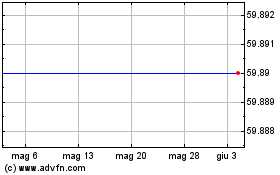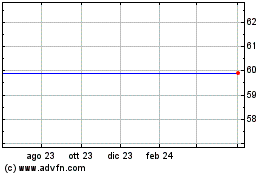The Stock Market Is Finally Beginning to Accept Reality
15 Maggio 2020 - 11:59AM
Dow Jones News
By Paul Vigna
For weeks, skeptical market observers have been asking: Why are
stocks rising? The rally seemed particularly at odds with the
backdrop of a global pandemic and the worst economy in decades.
Enter reality. It is becoming clearer that the economy isn't
going to come roaring back quickly, and investors are catching on.
The Dow lost 4.5% from Monday to Wednesday, its largest three-day
drop since hitting bottom in March. Economically sensitive sectors
such as energy and industrials were hit hardest, down 7.4% and 5.6%
through Thursday, respectively.
Let's look at this week's winners and losers.
Winner: Grubhub
Some companies sell computers, some sell services, some sell
dishwashers. The one thing that every company sells is its
story.
On the surface, ride-share company Uber Technologies Inc.'s bid
to buy home-delivery service Grubhub Inc. is a good story. Uber has
staked a lot on its Uber Eats division, home delivery is hot right
now and Grubhub is actually an attractive business.
Until last year, Grubhub was consistently profitable. It has
little debt on its balance sheet. Those are good numbers to
acquire. The plan for Uber is obvious: combine two of the bigger
players in the space, dominate, profit.
That story sold well. Grubhub shares were up 17% this week
through Thursday, and even Uber shares were roughly flat at $32.79.
The problem, though, isn't the Grubhub story. It's the Uber
story.
Assume Uber can mollify regulators, a big question on its own.
For all the hype around the company, it remains a money pit. Uber
lost more than $8 billion last year and has lost money in three of
the past four years. That was all before the coronavirus pandemic
hit.
Now it wants to dominate home delivery, but that industry is
suffering its own profitability crisis. The merger might lower
overhead costs, BTIG analyst Peter Saleh said, but added, "We are
unsure that it would be enough to reach profitability per
order."
Uber is absolutely great at selling its story, raising $24
billion in the private and public markets. It is less good at
creating profits. That is a story investors should care about.
Loser: The V-Shaped Meme
Another story that has been floating around Wall Street is the
"V-shaped recovery" -- the idea that the market and economy fell
fast and are due to recover at a similar pace.
The crux of the argument for a V-shaped recovery is the
narrative that the government and the central bank are going to
throw enough money at the problem to make it go away.
That sentiment lasted until this week. Sectors including energy,
industrials and financials started falling back to earth, dragged
by the weight of economic reality. Hedge-fund manager David Tepper
said the market is seriously overvalued. Peer Stanley Druckenmiller
said the risk-reward proposition is the worst he has ever seen.
"While risk-asset markets and the economy are sometimes
disconnected, they often suddenly and dramatically reconnect when
emotion exits and reality enters," Cantor Fitzgerald strategist
Peter Cecchini warned. "Market participants will eventually catch
on to the fact that there are no free lunches over the long
term."
Next Week: Retail Earnings
Retailers, whose fiscal years end a month later than the
calendar on your wall, start reporting first-quarter earnings next
week.
On Tuesday, Walmart Inc., Home Depot Inc. and Kohl's Corp.
report. Wednesday brings Lowe's Cos. and Target Corp. On Thursday,
it is TJX Cos. and BJ's Wholesale Club Holdings Inc., while Macy's
Inc. will present preliminary results and a "fireside chat" with
Chief Executive Jeff Gennette and Chief Financial Officer Paula
Price.
We already know most retailers have been severely hurt by the
pandemic. The hunt here is for relative strength. Are consumers
sprucing up their abodes while sheltering at home? Which retailers
are gaining share in grocery sales? Also, pay careful attention to
talk about cash flow and debt. Servicing debt is going to be
critical for retailers on edge.
-- To receive our Markets newsletter every morning in your
inbox, click here.
Write to Paul Vigna at paul.vigna@wsj.com
(END) Dow Jones Newswires
May 15, 2020 05:44 ET (09:44 GMT)
Copyright (c) 2020 Dow Jones & Company, Inc.
Grafico Azioni GrubHub (NYSE:GRUB)
Storico
Da Giu 2024 a Lug 2024

Grafico Azioni GrubHub (NYSE:GRUB)
Storico
Da Lug 2023 a Lug 2024
